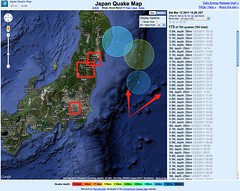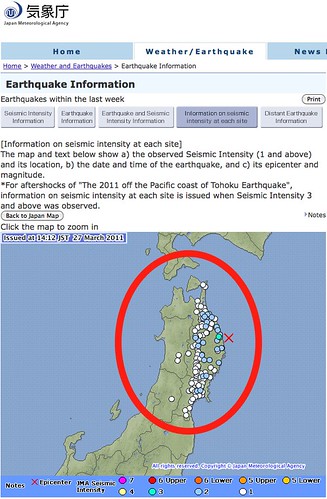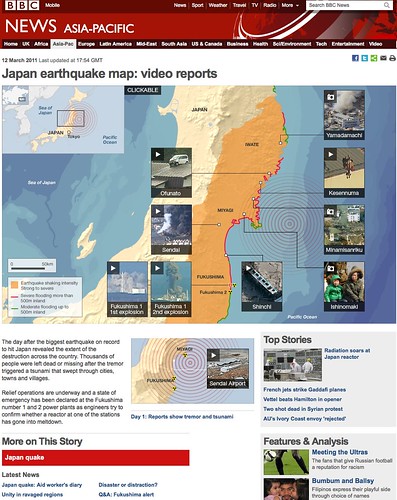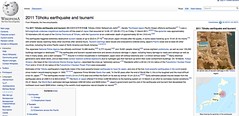On March 11 at 2:46pm JST a massive 9.0-magnitude earthquake occurred near the northeastern coast of Japan, creating extremely destructive tsunami waves which hit Japan just minutes after the earthquake, and triggering evacuations and warnings across the Pacific Ocean. The earthquake and tsunami have caused extensive and severe damage in Northeastern Japan, leaving thousands of people confirmed dead, injured or missing, and millions more affected by lack of electricity, water and transportation.
Source: google crisis response page (last accessed 22 Mar 2011)
LISTEN
Not only do we read or watch about a natural disaster unfolding, we get to hear as well. I learned about these sound recordings of the quake and aftershock (speeded up to be audible to human hearing) at Yahoo! News, 18 Mar 2011:
Ever wonder what the fourth-largest recorded earthquake since 1900 sounds like? The Laboratory of Applied Bioacoustics (LAB) has posted the eerie sound online. The Japan Agency for Marine-Earth Science and Technology (JAMSTEC), a network of underground observatories more than a thousand meters below sea level, made the chilling recording as the quake struck.
SEE
This website, Japan Quake Map, is brilliant. It's developed by Paul Nicholls, who developed the Christchurch Quake Map. The map shows a time-lapse visualisation of the Sendai earthquake and its aftershocks. It plots earthquake data from the U.S. Geological Survey using the Google Maps API. The size of the circle reflects the magnitude and the colour shows the "focal depth".

It's About Page explains that the site was built "primarily to help those outside the affected area understand what the people of Japan are experiencing."
PIECE TOGETHER
Following a few major news and related-agency websites, I found their reports up to date but they lacked the comprehensiveness I was looking for. Like, what were the place names, where and when did the quake first happened.
One report might talk about the power and food shortages in Tokyo. Another would cover the nuclear reactor crisis. A separate one would talk about the tsunami aftermath.
I think the terms "earthquake", "tsunami" and "nuclear reactors" became closely associated with "Japan". But I suspect not many people could link those separate events with the place names (it would be interesting to find out).
The Fukushima prefecture probably became a familiar sounding name to most people, because of the ongoing updates and reports of the reactor crisis. My guess is that not many people would know Sendai was the place most affected by the tsunami (they might know about the tusnami). Tokyo was mentioned in the subsequent days, though I'm not sure if people realised it suffered aftershocks and disrupted food supplies rather than the immediate threat of (the potential) nuclear fallout.
Information was scattered in that sense, with individual authoritative sites focusing on specific information.
Like the Japan Meteorology Agency quake information page, with a map can be expanded to show the epicentre and the seismic intensity in surrounding areas. But you wouldn't get a chronological sequence of events.

I think they updated the page over several days, if I wasn't mistaken. There's a list of place names down the page (didn't recall seeing that when I first visited the site).
The Google Crisis Response page was a convenient directory, though it wasn't quite the place to find all the information I was interested at that point.
The BBC News site is still one of my favourite news agency. Though in this case, it didn't quite provide what I had in mind. For instance, there are video footage linked to the place names. But clicking on the video for "Sendai", the caption only says "Sendai was hard hit. Aerial footage shows an industrial complex on fire, submerged houses and stranded ships". Nothing about the tusnami and flooding.

I wanted to find an English language page that summed up the chain of events, and the places affected. Eventually, I looked at the Wikipedia entry.

It was by far the most comprehensive in terms of the information I'm looking for. I even showed it to my Japanese friend, who currently resides in Singapore. Even she was impressed with the coverage, at a relatively short time.
BTW, my advise is still to make some attempt to verify information (or as my MSc professor would say, "Triangulation"). For me, by mentally referring to information from BBC and other news sources, I could use the Wikipedia information with greater confidence.
Next: Part 2 - "Friends and personal perspectives"

No comments:
Post a Comment
Join the conversation. Leave a comment :)
Note: only a member of this blog may post a comment.